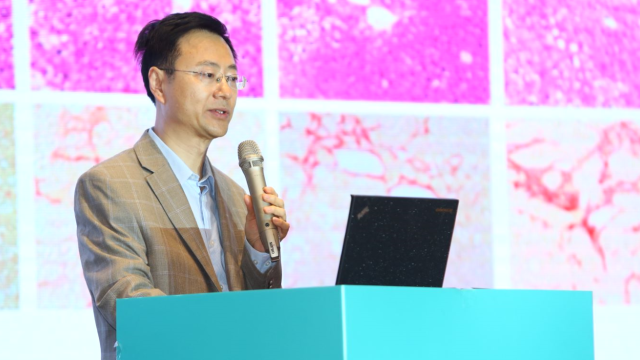Determinants of bacterial biofilm formation at the intestinal mucosal interface and their roles in pathogen exclusion
Josephine Ni
时长:19:22
分会场:2019中国肠道大会 - 消化道肿瘤大会
It is well-established that biofilms are critical for the pathogenesis of many bacterial infections, such as urinary tract infections and dental caries. More recently, biofilms have also been implicated in intestinal diseases such as colorectal cancer and inflammatory bowel disease, where mucosal-associated polymicrobial communities harvested from diseased colon worsens disease in animal models. Despite these studies, the presence of biofilms in the intestinal tract has been controversial. In this talk, I will review current evidence for biofilm formation in intestinal diseases and discuss my current model for investigating determinants of bacterial biofilm formation.
Josephine Ni
美国宾夕法尼亚大学医学院
"I joined the Division of Gastroenterology at the University of Pennsylvania in 2013 as a gastroenterology fellow in the basic science fellowship track, which is supported by the NIH T32 training grant under Dr. Anil Rustgi. For the past 5 years, I have been mentored by Dr. Gary Wu and have worked in his lab studying how dysbiotic microbiota develops and how to engineer the microbiota to exhibit different metabolic characteristics. My project focused on a mouse model for the development of the dysbiotic microbiota observed in patients with inflammatory bowel disease (IBD) and we discovered that this dysbiosis can be reproduced by inoculation of a properly prepared murine host with a single bacterial strain of E. coli (MP1) engineered to express only a single additional gene, urease. I further found that the inoculation of this urease positive strain of E. coli caused more severe colitis in a T cell mediated immune transfer model of murine colitis. I received a research award for this work and the findings were published in Science Translational Medicine (Ni J, et al. A Role for Bacterial Urease in Crohn’s Disease and Gut Dysbiosis). I pursued this project for several reasons. First, this project combines both my clinical interest in inflammatory bowel disease with my desire to pursue mechanistic basic science research. It also crosses several disciplines in science, and through this project I have learned immunology-based techniques such as cell-sorting as well as bacterial and mouse work. More importantly, this project has translational implications for potentially affecting disease by targeting the microbiota.
I was promoted to Instructor in 2016, and have continued research under the mentorship of Dr. Gary Wu. During this time, I have developed extensive experience designing microbiome-based studies. I want to become a tenure-track physician scientist at a major academic institution who specializes in the interface between gastrointestinal diseases (particularly IBD and colorectal cancer) and the microbiome. As a gastroenterologist, my clinical interest is in IBD and I currently am part of the Acute Care Clinic with a particular focus on IBD patients at Penn. My research interests focus on uncovering a potential mechanism behind the development of dysbiosis in IBD. Therefore, my ultimate goal is to be able to develop and provide targeted microbiota-based therapeutics to IBD patients
"


